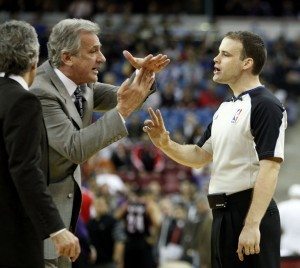Unless one is the recipient of 8 TV timeouts, sometimes as long as 2.5 minutes each- plus one’s normal allotment, coaches can find themselves pressed for time to effectively relay all the thoughts they’d like in many timeouts. And yet, many timeouts can go awry when coaches go off on unplanned or unnecessary tangents.
Let’s first focus on the three types of timeouts that occur pre-crunch time that can help determine control of the game or staying in the game:
1) Do you call timeouts to stop your opponent’s momentum? Ironically, the level at which this tactic is needed the most is generally the level you see it the least-high school ball. Conversely, this strategy is used most at the NBA level. Inevitably, you’ll find even average NBA strategists calling this timeout without exception. This timeout can often be pre-determined in general or from game to game.
2) Do you call a lot of “reading the riot act” timeouts? While the momentum stopping timeout is under-utilized at lower levels, the riot act timeout is easily the most over-utilized timeout- at least in high school and college. Undoubtedly, this timeout can and does occasionally work if and when players are generally tuned in beforehand anyway. On the other hand, if this timeout is constantly needed, the coach and players are out of synch to begin with and that problem usually won’t be solved in game.
3) Do you waste timeouts changing offenses, defenses or assignments when verbal or hand signals would suffice? Generally, it’s advisable to call this type of timeout only in the case of a major shift in strategy.
There are other also other less often used ways coaches waste timeouts such as not being sure on a correctable error. If you’re totally sure, during the next dead ball, tell your captain to tell the official you would like to discuss a possible correctable error situation. After the review, if you’re correct, you’re not charged with a timeout. If you’re incorrect, you are charged with the timeout.
Timeouts are also wasted sometimes on resting players. While there is a place for this type of timeout in late game situations and overtime games-especially on teams with short benches, the more this can be avoided, the better.
Late game timeout decision-making can also be pre-determined to a degree. As previously discussed, staffs should discuss as many scenarios as possible in the last three minutes of games, behind, ahead or tied. This won’t guarantee successful resolutions but it will reduce the element of surprise. Many late game timeouts are a matter of philosophy-such as do you call a timeout to try to run a specific last play- when behind? Or do you coach a strategy at practice for this situation and let your players “play” and not let your opponent set their defense.
Now, once a timeout has been granted, a timeout that was called for a good reason can also disintegrate if certain details aren’t predetermined beforehand:
- Do your players run to the bench and get organized or do they straggle?
- Do they have assigned seats?
- Do you and your assistants discuss matters? If so, how long?
- What’s the towel and water routine?
- What boards and markers are used? Who is the keeper of these?
- Are the subs’ roles defined in a timeout? You’ve all seen some subs’ timeout antics on the tube.
- Is the head coach the only speaker? If not, who else speaks and when?
If specific, urgent matters don’t need to be discussed, has a list of general concerns been composed? Do these need to be reviewed? Running out of things to say in a timeout isn’t necessarily bad, but if valuable things can be said, it’s certainly a plus. (Last Spring I was amazed at some of the most mundane things said in some NBA Finals’ huddles.) Everyone generally resorts to platitudes when they run out of real advice.
No coach really needs to be sold on the value of timeouts. Good ones can change the course of a game and then actually decide a game. In previous articles, we’ve discussed that seasons often hinge on the outcomes of 5-8 close games. Whether or not you win most of these games hinges on small differences and timeout management can be a significant game and season difference maker.
What other types of timeouts are wasted? What other timeout decorum is important?



